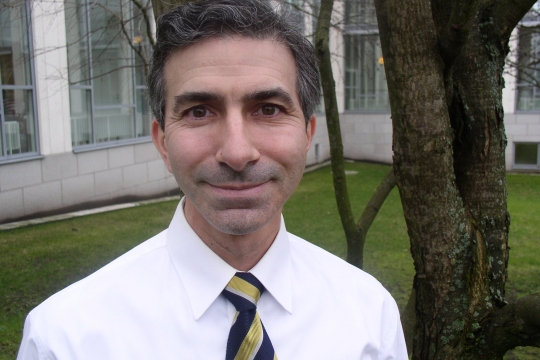Peter Parks, Professor at Rutgers University, New Jersey, USA, is here at the Environmental Economics Unit (EEU) to lecture in the advanced graduate course Natural Resource Economics.
Parks is widely acclaimed as a professor and this is the tenth year he has been asked to come here to teach PhD students – this year 32 of them from 17 countries.
The Natural Resource Economics course is one of the four specialized courses within the PhD program in environmental economics at the EEU that are also open to outside participation. Sida financed scholarships are offered to participants coming from developing countries. Peter Parks is one of the lecturers, along with Thomas Sterner and Gardner Brown.
Why did you choose to come all the way to Sweden to teach for the tenth year? "I certainly enjoy teaching. It is the best part of my job. I enjoy explaining perspectives to students who can then see, perhaps, challenges in their lives more clearly and be better able to develop solutions in their professional settings. I like teaching in the Sida program, where the students are either new professors themselves or PhDs training to be professors. I like that it offers opportunities to improve the research and the teaching skills of students who can immediately benefit from that improvement. For me it is important that students have a good, enjoyable time with me in the lessons, learning things that are useful for them. This program brings together students from many countries and that gives me the opportunity to help many people at the same time." What is the Natural Resource Economics course about? "This particular course is one of the series of courses that explains and explores the relationship between human society and the natural world. It examines this relationship and how it develops over time, and explores how to make sure not only that the value of the natural world is conserved, but also that nature is providing the necessary benefits to societies that depend on the natural world. It involves how to deduce economic values where those values are not manifested in markets." What is different about this course compared to others of its kind? "This course, being associated with the EEU, is associated with one of the leading institutions in the world to examine the relationship between environment and economic development, so its setting is ideal. In addition it brings together students who are ideally qualified to offer their experiences in class discussions. They are also qualified to take the benefits of their learning to their home countries to create and maintain improved economic policies as they relate to the natural world and the environment. I think those are the two key characteristics that distinguish the EEU program and courses from others. There are not many programs in the world like this one."Is it difficult to make the course relevant for students living in so many different countries? "Not really. A good professor has to be sensitive to the interests of the students, and must address their interests. The students in Natural Resource Economics have enough interests in common that our presentations can be tailored to meet their common needs. We can choose areas that -- with help from the EEU faculty -- can be adapted to specific interests in their home countries. Several students at the EEU are former students from the Sida financed PhD program, others want to develop their ideas more fully in their PhD studies, and others are involved in projects of the Environment for Development initiative (EfD) in their home countries."Why are you involved in environmental economics? "My father was a professor in natural science at Stanford, so my sister and I grew up in an academic home and in a family that loved getting out in nature. My personal interest is the natural world because that is how we grew up in my family. My skills are in seeing solutions that others might miss, and in explaining complicated processes in plain language to students and people of many different backgrounds. I love life as a professor. It is a nice life with little stress."
32 PhD students from 17 countries are attending the advanced graduate course Natural Resource Economics at the EEU this year. Peter Parks and Thomas Sterner are two of the lecturers.
